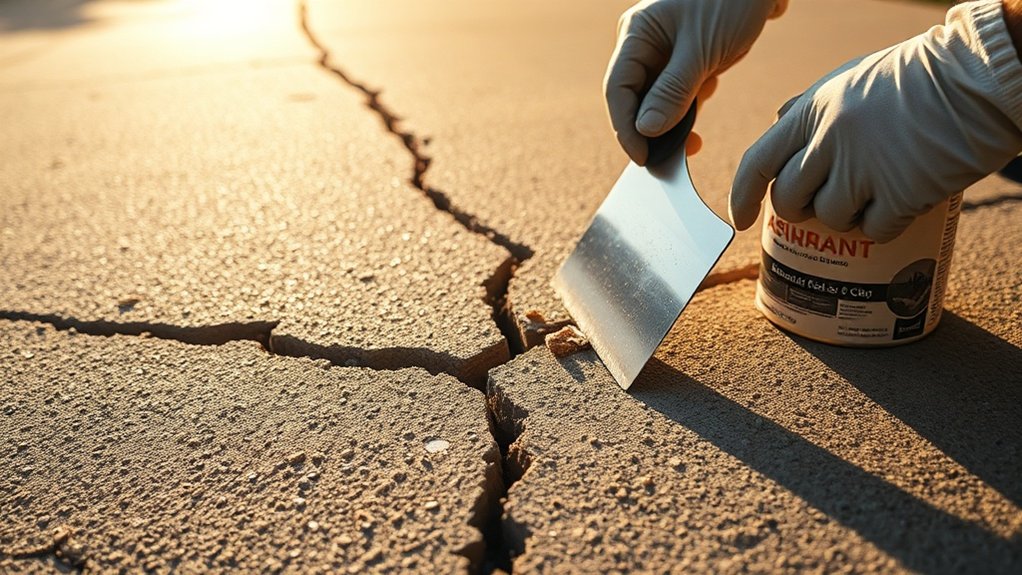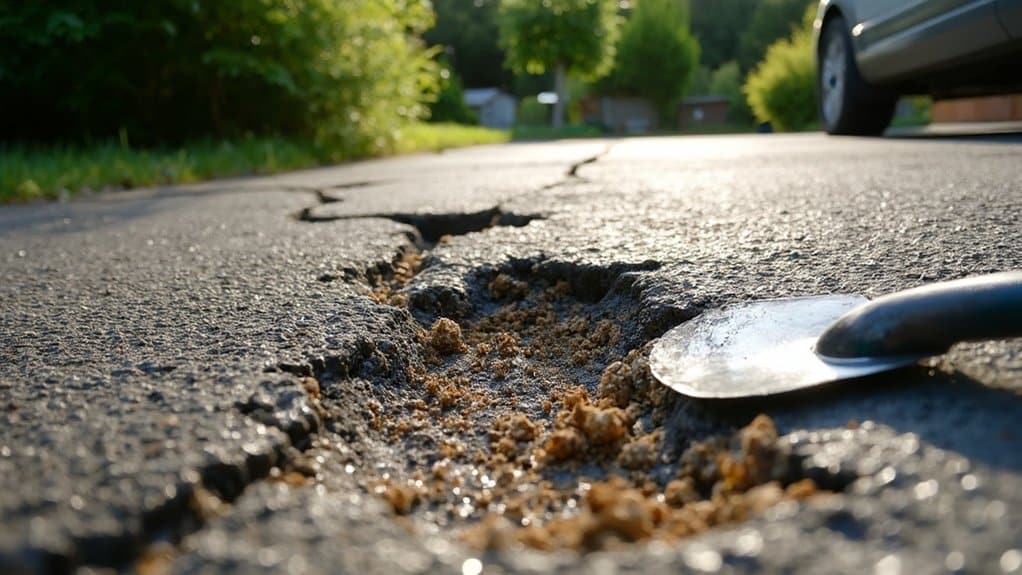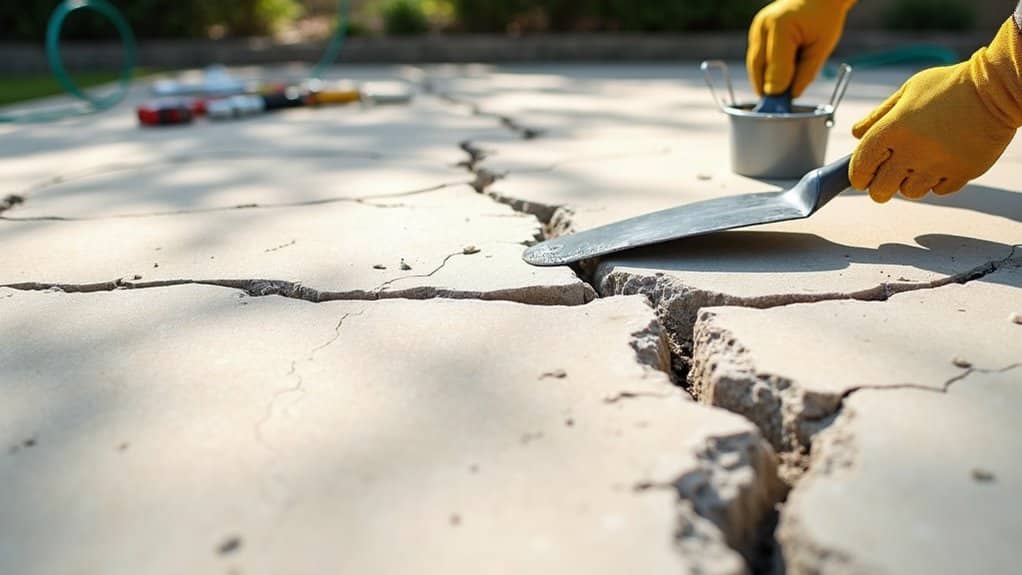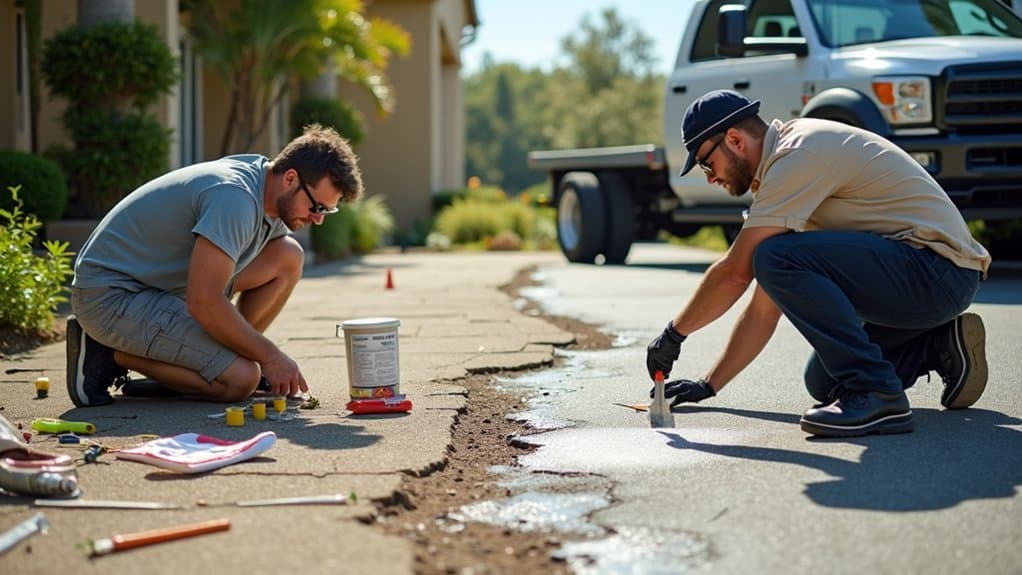Repairing a driveway crack can set you back anywhere from £130 for minor surface fixes to about £1,000 for larger patches, depending on the extent of the damage and the materials used. For small cracks, filling typically costs between £0.08 and £0.12 per linear foot. Larger repairs are generally priced by the square foot. Timely repairs and regular maintenance can save you money in the long run. If you’re interested in cost-effective strategies and options for your driveway, feel free to ask!
Table of Contents
ToggleKey Takeaways
How Much Does It Cost to Repair a Driveway Crack?
- Minor surface crack repairs usually range from £130 to £520, depending on the damage level.
- Small crack filling costs about £0.08 to £0.12 per linear foot, with service fees typically between £80 and £200.
- Repairs for larger or deeper cracks can be between £1.50 and £3.50 per square foot.
- If you opt for a DIY approach, materials might cost you between £15 and £150, while professional services generally start at around £250.
- Regular maintenance and prompt repairs are crucial to prevent higher costs down the line and to ensure your driveway lasts longer.
Average Costs of Driveway Crack Repair
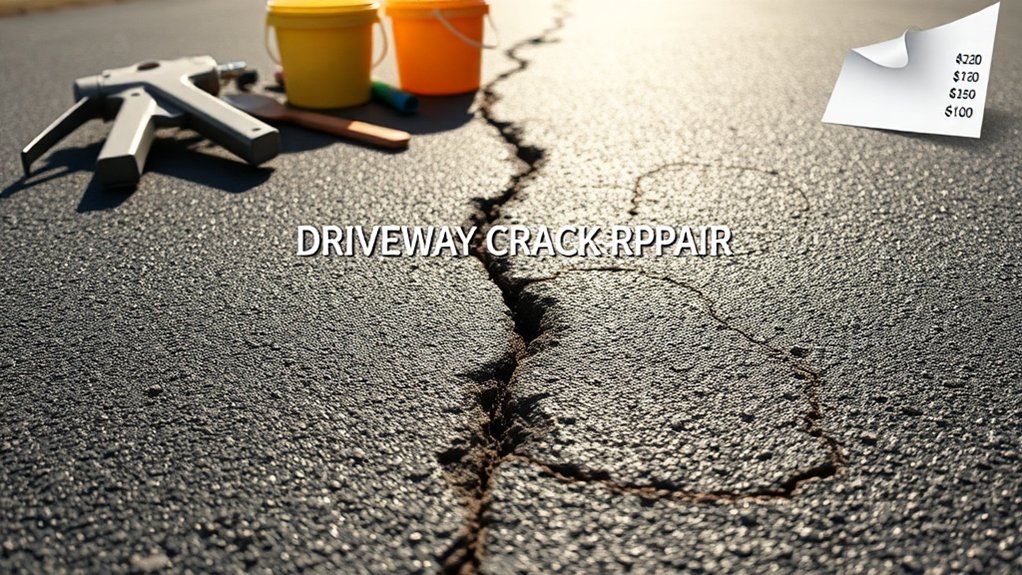
When it comes to repairing driveway cracks, knowing the average costs can help you plan your budget. For minor surface cracks, repairs usually range from £130 to £520. If you’re filling small cracks, prices can be as low as £0.08 to £0.12 per linear foot, but most professionals charge between £80 and £200 for service fees. For larger or deeper cracks, you can expect to pay between £1.50 and £3.50 per square foot. On average, homeowners spend around £1,000 to patch a 24′ x 24′ driveway. Timely repairs can save hundreds in potential future costs, making it a wise investment for homeowners. Regular maintenance, such as sealing and cleaning, is crucial to prolong the driveway’s life and prevent new cracks.
Factors Influencing Repair Costs
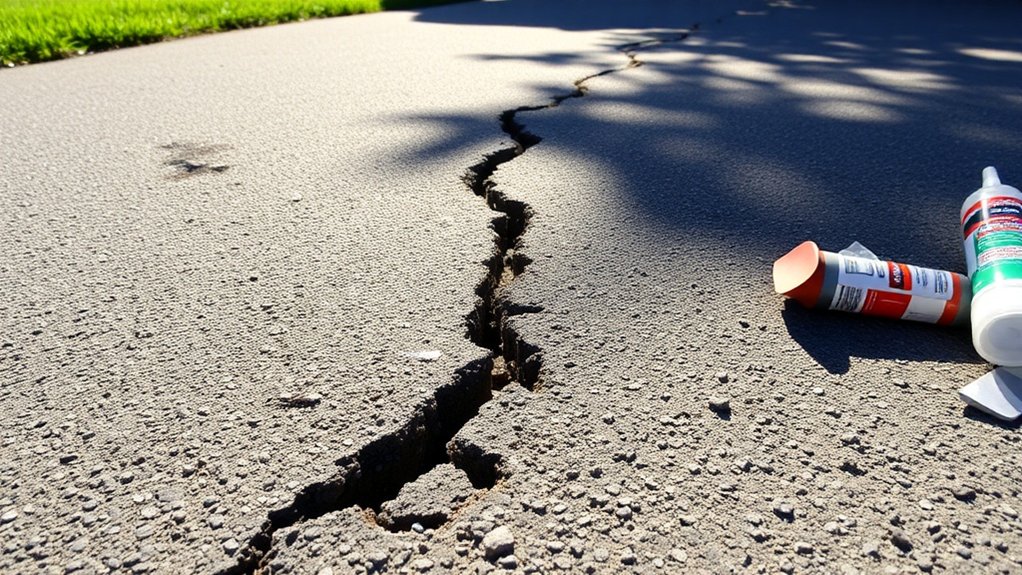
When it comes to repairing cracks in your driveway, the level of damage and your chosen repair method are key factors that affect costs. For instance, minor cracks may only require a simple filling, whereas larger problems like potholes or significant structural issues will need more extensive repairs, which can significantly increase your expenses. Additionally, the type of driveway material, such as asphalt, can influence your repair costs due to varying labor and material expenses associated with different types of damage. Regular routine inspections can help identify issues early, potentially saving you money in the long run.
Damage Extent
Understanding the extent of damage to your driveway is crucial for estimating repair costs. The classification of cracks significantly influences the urgency and expense of repairs.
Here are some key factors to consider:
- Crack depth and width: Larger cracks lead to higher material and labour costs.
- Crack length and area: Small, isolated cracks are less expensive to fix compared to extensive cracking across larger areas.
- Damage pattern: If cracks are concentrated in one area, targeted repairs can be more cost-effective. Early intervention can help prevent further damage and reduce overall repair expenses.
- Base condition: If the underlying base is damaged, repairs will be more extensive and costly.
- Environmental factors: Issues like freeze-thaw cycles and heavy traffic can exacerbate damage, leading to increased repair costs.
Repair Method Choice
Selecting the appropriate repair method for your driveway cracks can significantly influence your overall expenses, so it’s crucial to consider your options carefully. Your decision will impact both the effectiveness of the repair and its long-term durability. Here are some options to think about:
| Repair Method | Cost Range | Durability |
|---|---|---|
| Crack Filling | Low | Short-term |
| Crack Sealing | Moderate | Medium-term |
| Rout-and-Seal | Higher | Long-term |
| Concrete Resurfacing | High | Very long-term |
| Slabjacking | Highest | Exceptional durability |
For instance, if you’re looking for a quick fix without spending too much, crack filling might be suitable, but don’t expect it to last. On the other hand, if you’re after a solution that will endure, consider concrete resurfacing or slabjacking, even though they come at a higher price. Additionally, effective drainage management is crucial for preventing further damage and ensuring the longevity of your repairs.
Specific Repair Types and Their Costs
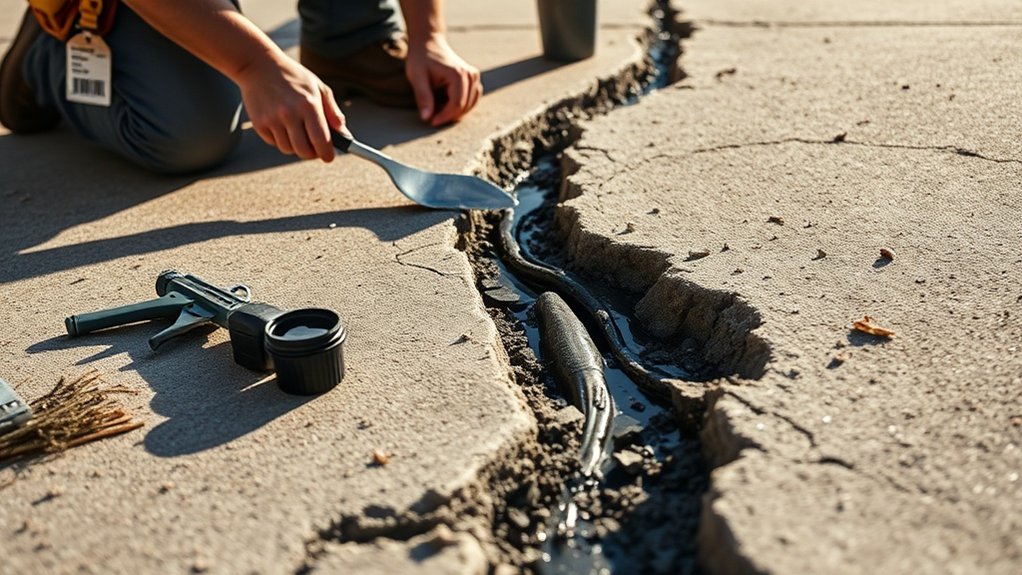
When it comes to driveway repairs, knowing the costs of different options is essential.
Crack filling is usually the most cost-effective choice, whereas resurfacing or complete replacement can significantly increase your expenses.
Here’s a quick breakdown to help you choose the best route for your driveway.
Crack Filling Costs
While it may be tempting to ignore minor cracks in your driveway, addressing them quickly can save you money in the long run.
Crack sealing is essential for improving appearance and preventing further damage. Here’s a quick overview of costs:
- Minor surface cracks: £0.50 to £3 per linear foot
- DIY patching materials: £5 to £15 per average-sized crack
- Professional labour: costs vary based on the extent of damage and location
- Hairline cracks: £1.75 to £2 per square foot
- Pitting or crumbling: £1.75 to £2 per square foot
Proper surface preparation is crucial before applying any filler.
Whether you opt for a DIY solution or hire a professional, timely repairs can significantly extend the life of your driveway.
Resurfacing Price Range
Addressing cracks in your driveway is just the first step; resurfacing can rejuvenate it, ensuring longevity and improving its appearance.
For asphalt, expect to pay around £1 to £3 per square metre, averaging about £1,100 for a standard driveway.
If you’re opting for concrete, costs range from £3 to £7 per square metre, potentially reaching £2,500 for a single-car driveway.
Decorative finishes can increase these prices significantly, sometimes up to £20 per square metre.
Tar-and-chip resurfacing is a more budget-friendly option at £2 to £5 per square metre.
Complete Replacement Expenses
Replacing a driveway can seem daunting, but knowing the costs for various materials can guide your choice.
Here’s a brief overview of replacement expenses based on material:
- Concrete: £30–£120 per sq. m; total cost £1,500–£6,000.
- Asphalt: £25–£100 per sq. m; total cost £2,500–£4,000.
- Pavers: £85–£250 per sq. m; total cost £4,000–£12,000+.
- Gravel: Under £25 per sq. m; total cost under £800.
Consider your budget and the look you want to achieve when choosing a material.
Materials Cost Overview
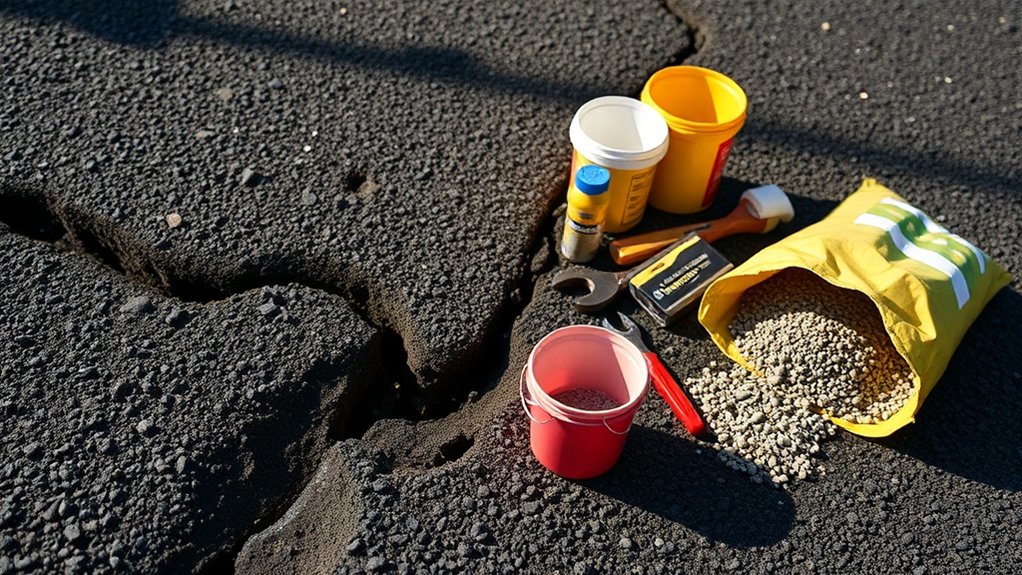
When repairing driveway cracks, it’s important to understand the cost of materials to budget your project effectively. The type of repair materials you choose can significantly affect your expenses.
For concrete cracks, fillers typically range from £4 to £8 per bottle, while pre-mixed patching compounds are priced at around £6 to £10 for 3 square feet. Asphalt fillers generally cost between £0.25 and £0.75 per linear foot.
If you’re working with gravel, materials usually range from £1 to £1.50 per square foot, making it a cost-effective choice. Using high-quality materials can result in more durable repairs, so it may be worth spending a bit extra.
Additionally, regular inspections and maintenance can help identify cracks early, reducing future repair costs.
Labor and Additional Expenses
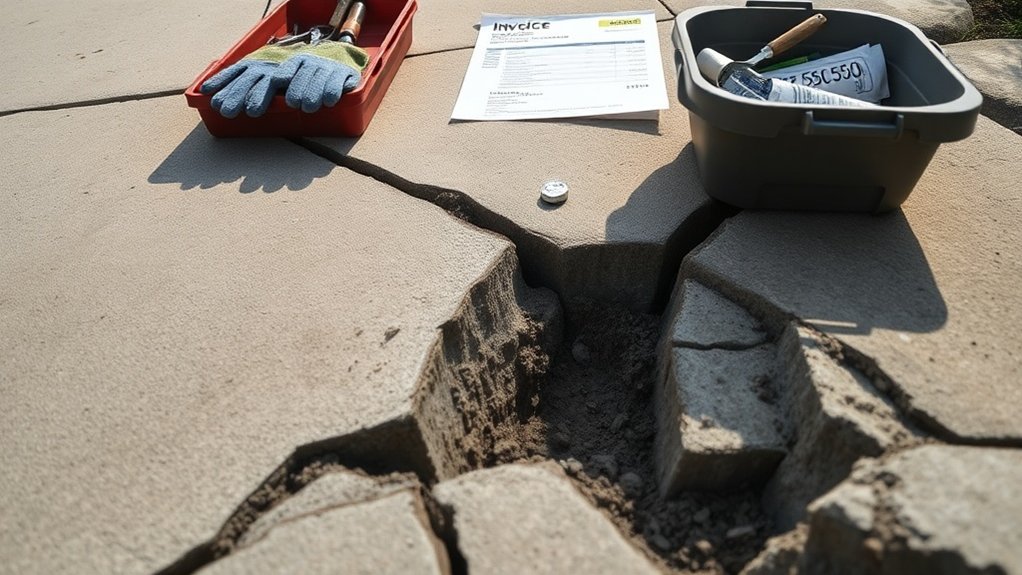
When planning your driveway crack repair, it’s important to consider labour and additional costs that can significantly affect your budget.
Knowing the labour rates and having a clear breakdown of expenses will help you manage your finances effectively.
- Typical labour charges range from £15 to £25 per square metre for minor repairs.
- More complex tasks can escalate to £50 per square metre.
- Minimum labour fees may apply, even for small jobs.
- Materials like crack fillers can cost around £40.
- Using specialised techniques can considerably increase the overall expense.
Cost-Saving Tips for Driveway Repairs
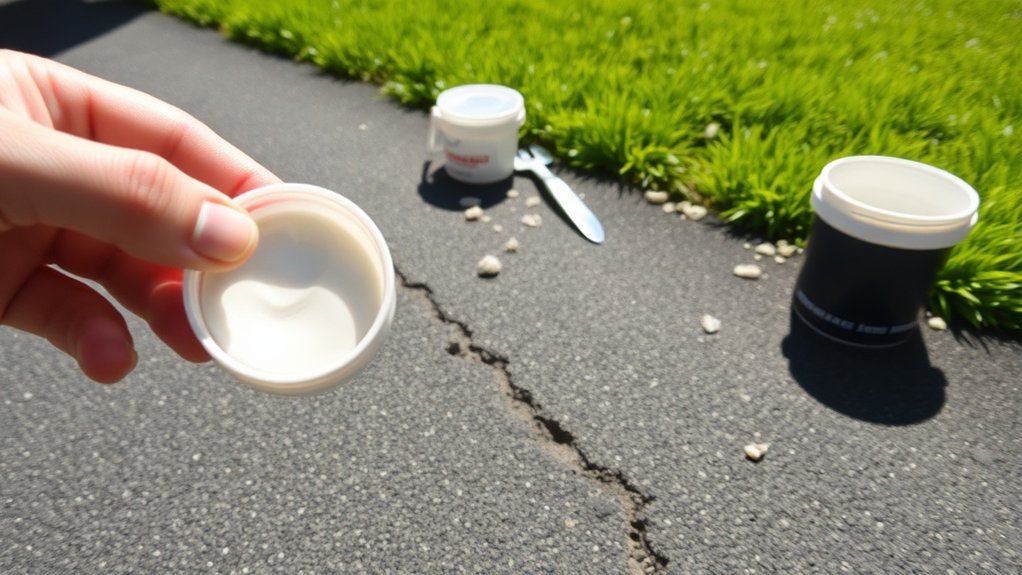
To reduce driveway repair costs, you can take several strategic steps that will help manage your budget effectively. Using affordable materials and carrying out regular maintenance can lead to long-term savings. Here are some useful tips:
| Strategy | Benefit |
|---|---|
| Schedule in Off-Peak | Lower repair costs |
| DIY Minor Repairs | Save on labour costs |
| Buy Materials in Bulk | Significant discounts |
| Regular Sealing | Prevents costly damage |
For instance, scheduling repairs during quieter periods can often mean lower rates from contractors. Additionally, tackling small repairs yourself can save you a considerable amount on labour. Buying materials in bulk is also a smart move, as suppliers may offer discounts for larger quantities. Finally, sealing your driveway regularly can help avoid expensive repairs down the line.
Importance of Routine Maintenance
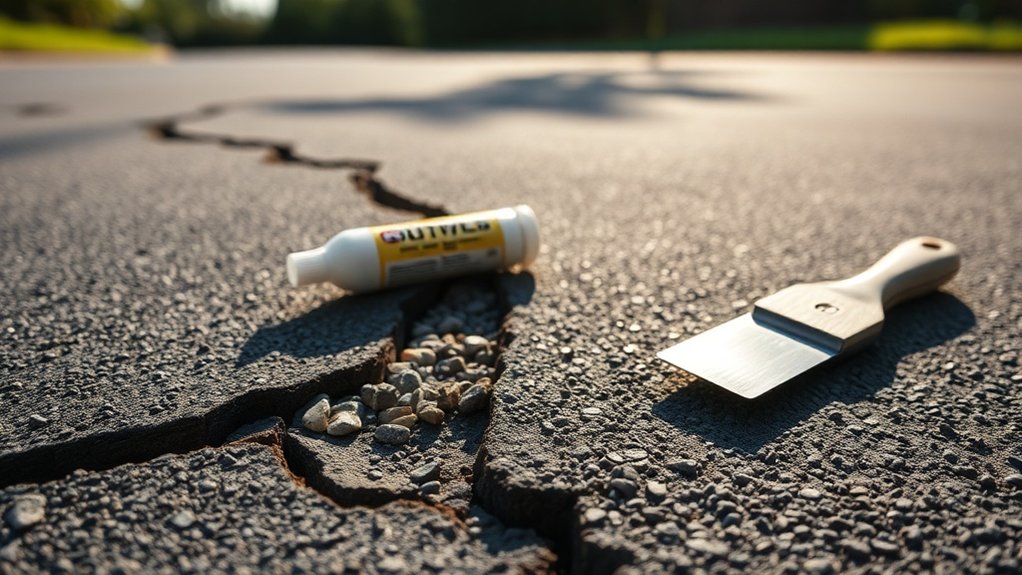
Routine maintenance is crucial for keeping your driveway in excellent condition and avoiding expensive repairs later on. By scheduling regular inspections and preventative care, you can prolong your driveway’s lifespan and increase your property’s value.
- Prevent small cracks from developing into significant problems.
- Apply sealant every 2–3 years to protect against UV damage and moisture.
- Fill in cracks promptly to stop water from seeping through.
- Carry out annual inspections to identify early signs of wear.
- Benefit from improved safety and enhanced curb appeal with a well-maintained surface.
By following these practices, you’ll not only save on repairs but also create a safer environment and elevate your home’s appearance.
Making routine maintenance a priority is a smart investment in the long run!
DIY vs. Professional Repair Options
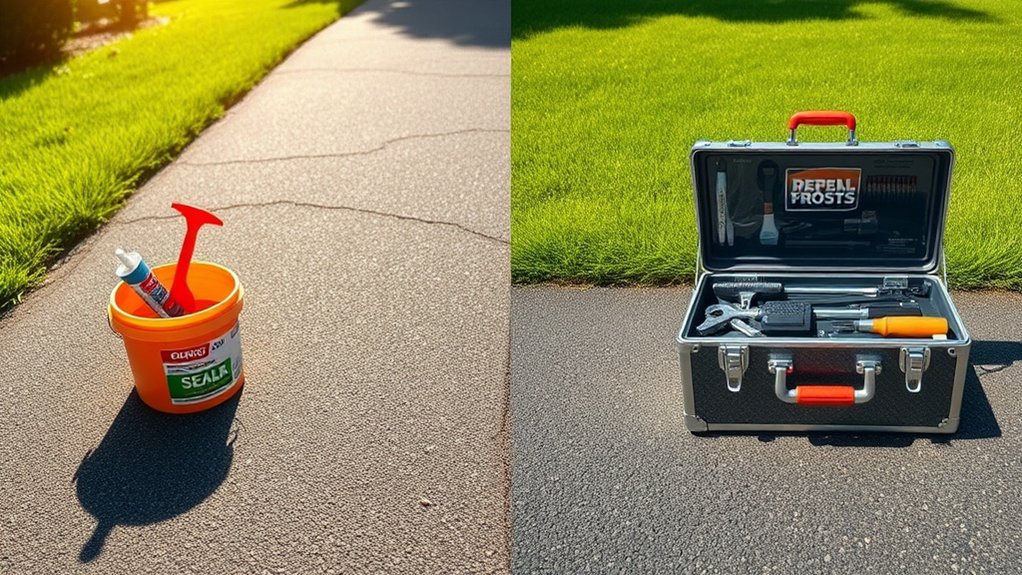
Maintaining your driveway not only improves its appearance but also helps you decide how to deal with cracks when they arise. You can opt for DIY methods or hire a professional.
DIY repairs are generally more affordable, usually costing between £15 and £150 for materials, which allows for quick action. However, success depends on your skill level; improper repairs can lead to bigger problems.
In contrast, professional services start at around £250 for minor jobs but come with significant advantages. Professionals use high-quality materials and techniques for durable results, ensuring thorough cleaning and application.
Ultimately, consider the short-term savings of DIY against the long-term benefits and peace of mind that professional repairs offer, especially for extensive damage.
When to Consider Full Driveway Replacement
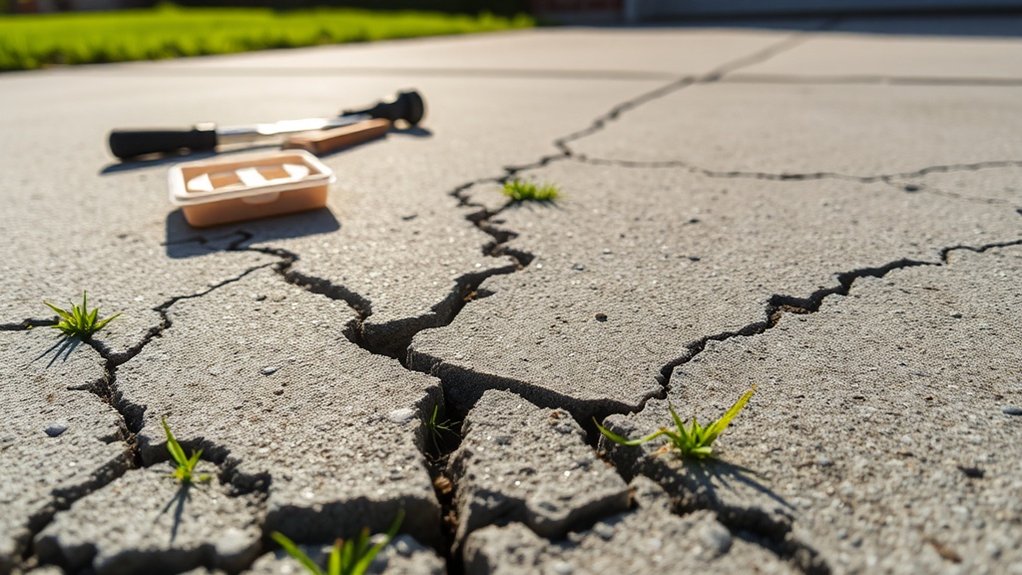
When cracks and deterioration become more than just minor issues, it may be time to consider a full driveway replacement.
Here are some signs that indicate replacement could be the best option:
- Extensive cracking, deep potholes, or severe surface damage
- Structural problems such as sinking or foundational issues
- Recurring cracks that continue to worsen despite repairs
- Driveways suffering from various types of damage, including drainage problems
- Repair costs approaching 50% of the price of a new driveway
Replacing your driveway not only resolves these issues but also enhances kerb appeal and can increase your property value.
Additionally, the age and material of your driveway should factor into your decision, ensuring you achieve long-term satisfaction and safety.
Frequently Asked Questions
How Long Does Driveway Repair Typically Take to Complete?
Driveway repairs usually take a few hours to a week, depending on the type of repair and weather conditions. For instance, small cracks can set quickly, allowing you to use the driveway soon after. However, larger patches or concrete repairs may take longer to cure before the surface is usable.
Can I Repair Driveway Cracks in Winter or Cold Weather?
Yes, you can repair driveway cracks in winter or cold weather, but ensure temperatures remain above freezing. Use materials specifically designed for low temperatures, and make sure the surface is dry and clean before applying.
What Are the Signs of a Failing Driveway Needing Replacement?
Is your driveway showing signs of wear? Check for cracks wider than 3mm and any surface deterioration. If you spot these issues, it may be time to consider a complete replacement for safety and practicality.
Are There Eco-Friendly Options for Driveway Repair Materials?
Yes, there are sustainable materials and biodegradable sealants available for driveway repairs. Eco-friendly sealers and products made from renewable resources not only help the environment but also improve the durability and performance of your driveway. For instance, using water-based sealants can be a great alternative to traditional options.
How Can I Prevent Future Cracks in My Driveway?
To prevent future cracks in your driveway, make sure to apply sealant every few years and keep up with regular maintenance. Check for minor damage promptly, and ensure proper drainage to direct water away from the surface. For instance, cleaning out any blocked gutters or drains can help prevent water pooling, which is a common cause of cracks.
Conclusion
Maintaining a crack-free driveway is crucial for its longevity, much like repairing a tear in a favourite coat. Understanding the costs involved can help you make budget-friendly decisions. Whether you choose to do the repairs yourself or hire a professional, addressing cracks promptly can prevent more serious issues down the line. So, take the time to care for your driveway; it will pay off with years of durability.
Fixing common tarmac driveway problems is essential for longevity; discover the best strategies to address cracks, potholes, and drainage issues Read more
Observe the best techniques to repair cracks in your concrete driveway, and discover the secrets to ensuring a long-lasting, durable Read more
Keep your driveway looking flawless with our guide on repairing cracks—will you tackle it yourself or call in the pros? Read more

